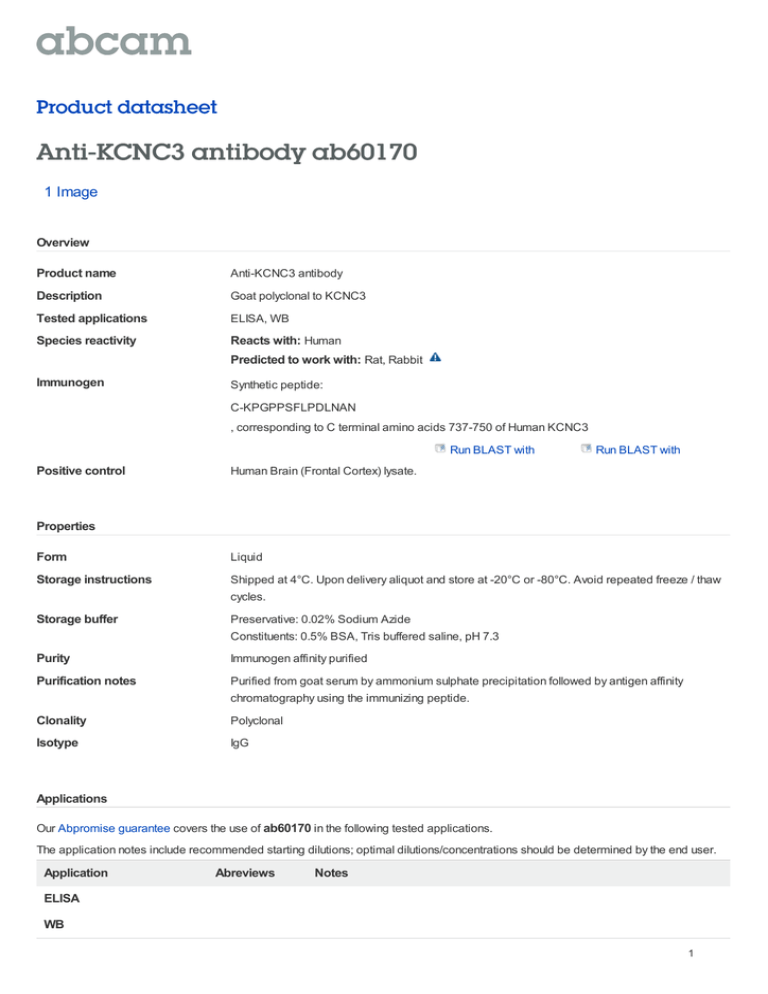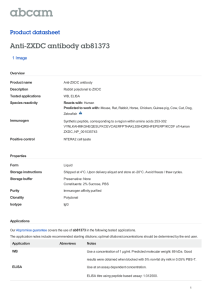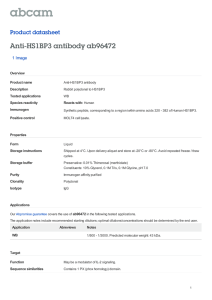Anti-KCNC3 antibody ab60170 Product datasheet 1 Image
advertisement

Product datasheet Anti-KCNC3 antibody ab60170 1 Image Overview Product name Anti-KCNC3 antibody Description Goat polyclonal to KCNC3 Tested applications ELISA, WB Species reactivity Reacts with: Human Predicted to work with: Rat, Rabbit Immunogen Synthetic peptide: C-KPGPPSFLPDLNAN , corresponding to C terminal amino acids 737-750 of Human KCNC3 Run BLAST with Positive control Run BLAST with Human Brain (Frontal Cortex) lysate. Properties Form Liquid Storage instructions Shipped at 4°C. Upon delivery aliquot and store at -20°C or -80°C. Avoid repeated freeze / thaw cycles. Storage buffer Preservative: 0.02% Sodium Azide Constituents: 0.5% BSA, Tris buffered saline, pH 7.3 Purity Immunogen affinity purified Purification notes Purified from goat serum by ammonium sulphate precipitation followed by antigen affinity chromatography using the immunizing peptide. Clonality Polyclonal Isotype IgG Applications Our Abpromise guarantee covers the use of ab60170 in the following tested applications. The application notes include recommended starting dilutions; optimal dilutions/concentrations should be determined by the end user. Application Abreviews Notes ELISA WB 1 Application notes Peptide ELISA: antibody detection limit dilution 1/32000. WB: Use at a concentration of 0.3 - 1 µg/ml. Detects a band of approximately 80 kDa (predicted molecular weight: 81 kDa). Not yet tested in other applications. Optimal dilutions/concentrations should be determined by the end user. Target Function This protein mediates the voltage-dependent potassium ion permeability of excitable membranes. Assuming opened or closed conformations in response to the voltage difference across the membrane, the protein forms a potassium-selective channel through which potassium ions may pass in accordance with their electrochemical gradient. Involvement in disease Defects in KCNC3 are the cause of spinocerebellar ataxia type 13 (SCA13) [MIM:605259]. Spinocerebellar ataxia is a clinically and genetically heterogeneous group of cerebellar disorders. Patients show progressive incoordination of gait and often poor coordination of hands, speech and eye movements, due to degeneration of the cerebellum with variable involvement of the brainstem and spinal cord. SCA13 is an autosomal dominant cerebellar ataxia (ADCA) characterized by slow progression and variable age at onset, ranging from childhood to late adulthood. Mental retardation can be present in some patients. Sequence similarities Belongs to the potassium channel family. C (Shaw) (TC 1.A.1.2) subfamily. Kv3.3/KCNC3 subsubfamily. Domain The segment S4 is probably the voltage-sensor and is characterized by a series of positively charged amino acids at every third position. The tail may be important in modulation of channel activity and/or targeting of the channel to specific subcellular compartments. Cellular localization Membrane. Anti-KCNC3 antibody images Anti-KCNC3 antibody (ab60170) at 0.3 µg/ml + Human Brain (Frontal Cortex) lysate (35µg protein in RIPA buffer) Predicted band size : 81 kDa Observed band size : 80 kDa Western blot - KCNC3 antibody (ab60170) Please note: All products are "FOR RESEARCH USE ONLY AND ARE NOT INTENDED FOR DIAGNOSTIC OR THERAPEUTIC USE" Our Abpromise to you: Quality guaranteed and expert technical support Replacement or refund for products not performing as stated on the datasheet Valid for 12 months from date of delivery 2 Response to your inquiry within 24 hours We provide support in Chinese, English, French, German, Japanese and Spanish Extensive multi-media technical resources to help you We investigate all quality concerns to ensure our products perform to the highest standards If the product does not perform as described on this datasheet, we will offer a refund or replacement. For full details of the Abpromise, please visit http://www.abcam.com/abpromise or contact our technical team. Terms and conditions Guarantee only valid for products bought direct from Abcam or one of our authorized distributors 3

